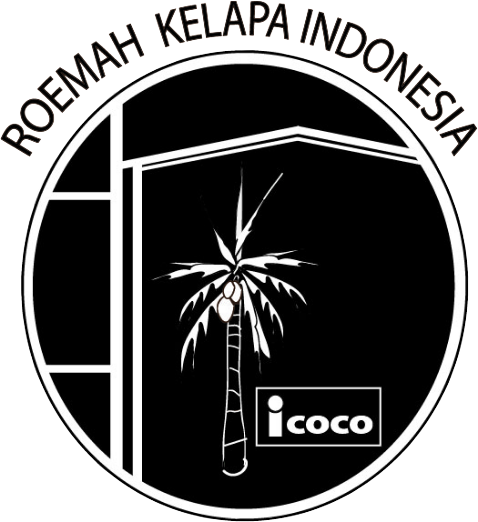
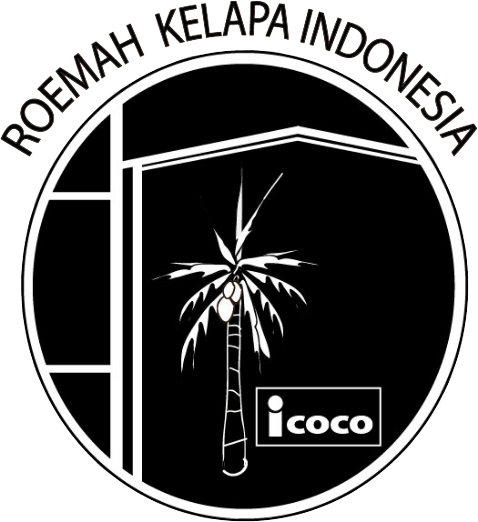
Roemah Kelapa Indonesia Group
OUR PROJECT
INNOVATION VALLEY, JONGGOL
RoeKI and IPB Pioneer Model Plantation with Five Premier Varieties
INNOVATION VALLEY, JONGGOL
RoeKI and IPB Pioneer Model Plantation with Five Premier Varieties
Integrated Coconut Demonstration Farm with Polyculture and GAP Implementation
Roemah Kelapa Indonesia (RoeKI) is developing an Integrated Coconut Demonstration Farm in Jonggol Innovation Valley as a replicable model for sustainable coconut farming. The 10-hectare plot applies a polyculture system combined with full Good Agricultural Practices (GAP) to improve productivity, diversify farmer income, and strengthen ecological balance.
Key coconut varieties include:
Genjah Pandan Wangi – premium aromatic young coconut with strong demand in beverage and hospitality markets.
Genjah Entog Kebumen – a high-yield dwarf variety offering faster farmer returns.
Sap-Producing Tall Coconut – for coconut sugar, bioethanol, and sap-based products.
Kopyor Coconut – niche premium product with strong specialty food value.
CM Herbal Coconut – functional variety for nutraceutical and health markets.
The farm also integrates intercrops such as banana, pineapple, rice, ginger, and turmeric, along with legumes, betel nut, and erosion-control crops for soil and biodiversity improvement.
By adopting GAP standards covering land preparation, nutrient management, pest control, harvest handling, and worker safety the farm ensures food safety, sustainability, and export readiness.
This project serves as a training hub, innovation site, and live classroom for farmers, youth, and agricultural stakeholders. Ultimately, RoeKI aims to demonstrate that polyculture coconut farming can deliver higher yields, diversified income, and climate-resilient agriculture for Indonesia’s coconut industry.

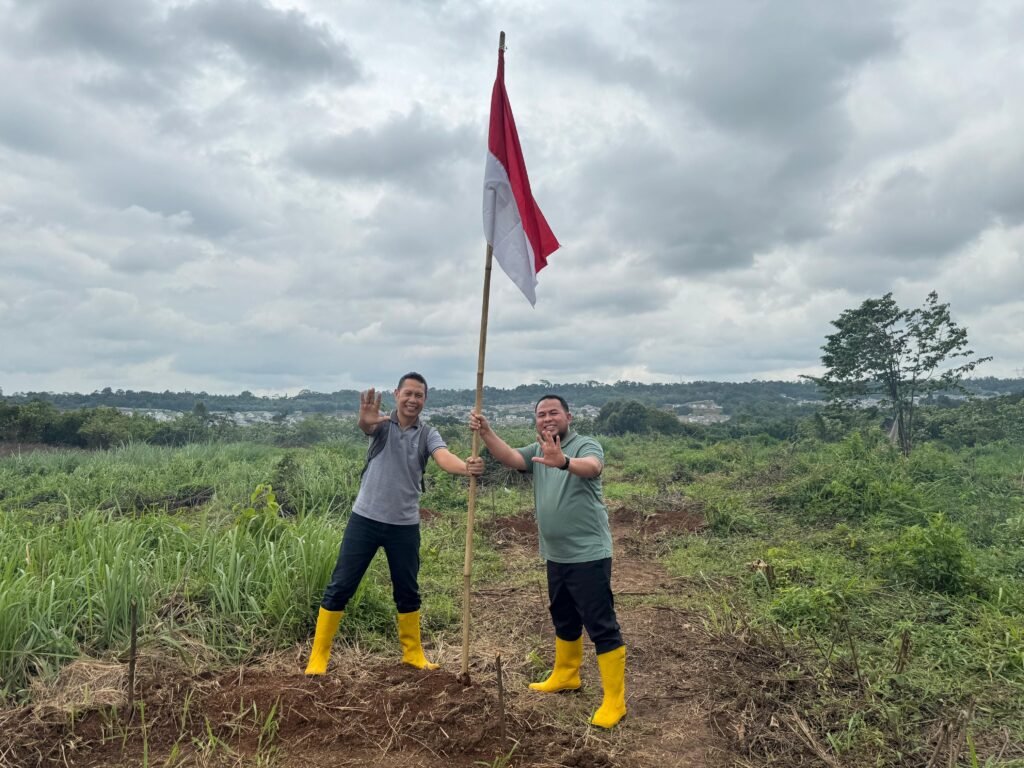
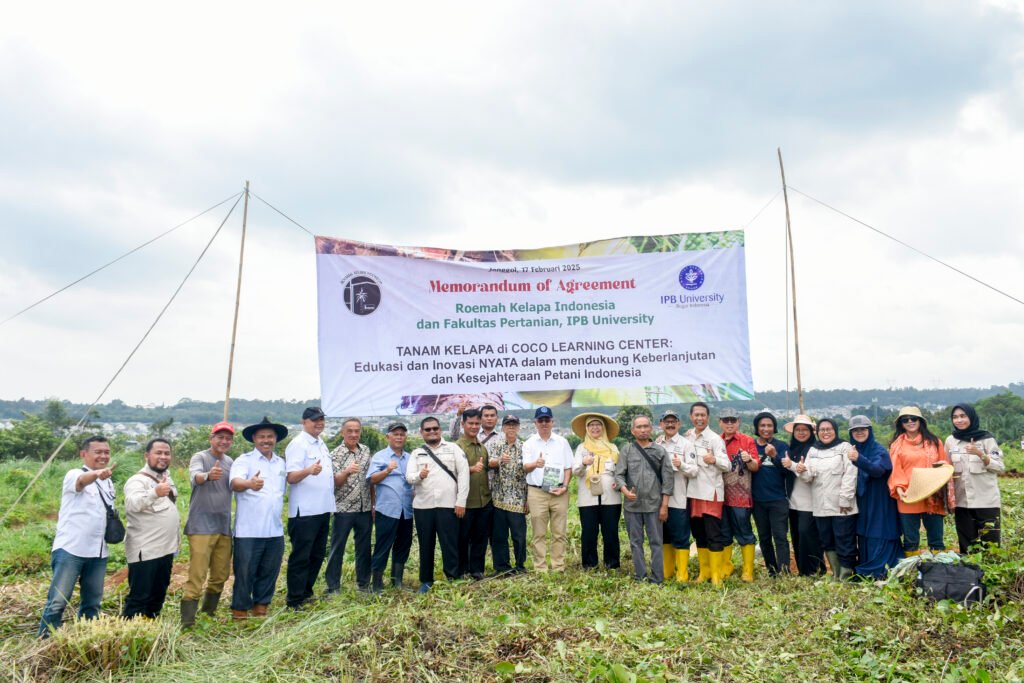
Integrated Coconut Demonstration Farm with Polyculture and GAP Implementation
Roemah Kelapa Indonesia (RoeKI) is developing an Integrated Coconut Demonstration Farm in Jonggol Innovation Valley as a replicable model for sustainable coconut farming. The 10-hectare plot applies a polyculture system combined with full Good Agricultural Practices (GAP) to improve productivity, diversify farmer income, and strengthen ecological balance.
Key coconut varieties include:
Genjah Pandan Wangi – premium aromatic young coconut with strong demand in beverage and hospitality markets.
Genjah Entog Kebumen – a high-yield dwarf variety offering faster farmer returns.
Sap-Producing Tall Coconut – for coconut sugar, bioethanol, and sap-based products.
Kopyor Coconut – niche premium product with strong specialty food value.
CM Herbal Coconut – functional variety for nutraceutical and health markets.
The farm also integrates intercrops such as banana, pineapple, rice, ginger, and turmeric, along with legumes, betel nut, and erosion-control crops for soil and biodiversity improvement.
By adopting GAP standards covering land preparation, nutrient management, pest control, harvest handling, and worker safety the farm ensures food safety, sustainability, and export readiness.
This project serves as a training hub, innovation site, and live classroom for farmers, youth, and agricultural stakeholders. Ultimately, RoeKI aims to demonstrate that polyculture coconut farming can deliver higher yields, diversified income, and climate-resilient agriculture for Indonesia’s coconut industry.



CROWDFUNDING CAMPAIGN
Sustainable Coconut Husk Insulation
CROWDFUNDING CAMPAIGN
Sustainable Coconut Husk Insulation
On Tuesday, May 2, 2023, RoeKI officially launched the financing phase of its crowdfunding project on Startnext. This initiative is part of the “Fair Gründen” program, which supports social and international start-ups in creating sustainable solutions. We are proud to be part of this important movement.
One of RoeKI’s key innovations is insulation material made from sustainable coconut husk. For years, coconut husk has been treated as waste and often burned, releasing harmful CO² emissions into the atmosphere. RoeKI provides a sustainable alternative by transforming coconut husk into a valuable resource while making a tangible contribution to climate protection.
Key Benefits of RoeKI’s Innovation:
Sustainable and renewable – utilizing coconut husk as an abundant natural resource.
Emission reduction – preventing the daily burning of husks and the release of CO².
Eco-friendly and efficient – offering safe, durable, and effective insulation solutions.
Climate protection – supporting global efforts to reduce carbon emissions and build a greener future.
Through this innovation, RoeKI not only delivers environmentally friendly insulation solutions but also creates new economic value for local communities that rely on coconut-based livelihoods.

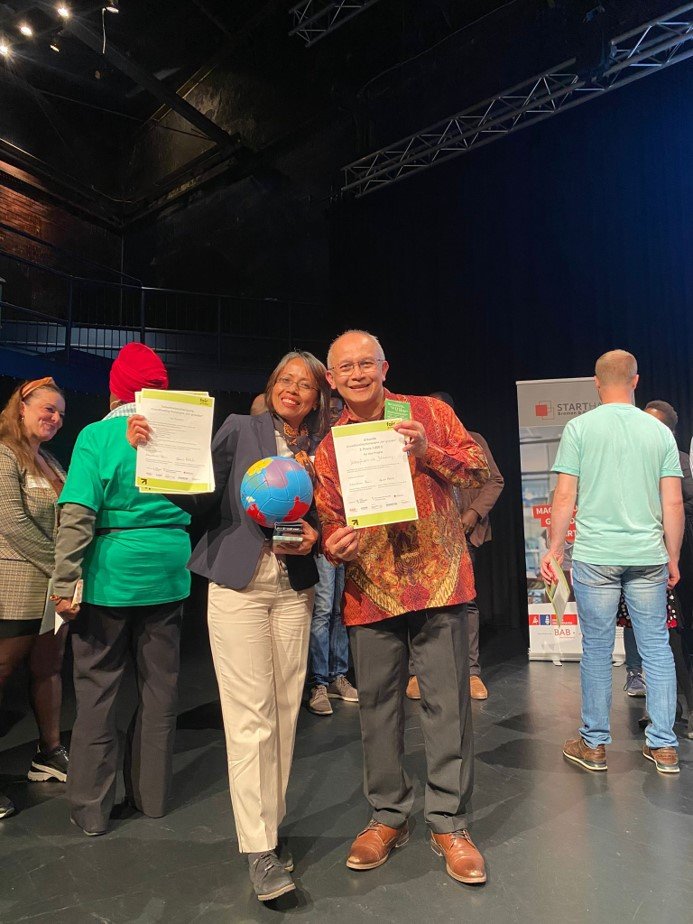
On Tuesday, May 2, 2023, RoeKI officially launched the financing phase of its crowdfunding project on Startnext. This initiative is part of the “Fair Gründen” program, which supports social and international start-ups in creating sustainable solutions. We are proud to be part of this important movement.
One of RoeKI’s key innovations is insulation material made from sustainable coconut husk. For years, coconut husk has been treated as waste and often burned, releasing harmful CO² emissions into the atmosphere. RoeKI provides a sustainable alternative by transforming coconut husk into a valuable resource while making a tangible contribution to climate protection.
Key Benefits of RoeKI’s Innovation:
Sustainable and renewable – utilizing coconut husk as an abundant natural resource.
Emission reduction – preventing the daily burning of husks and the release of CO².
Eco-friendly and efficient – offering safe, durable, and effective insulation solutions.
Climate protection – supporting global efforts to reduce carbon emissions and build a greener future.
Through this innovation, RoeKI not only delivers environmentally friendly insulation solutions but also creates new economic value for local communities that rely on coconut-based livelihoods.


RoeKI and Hollit International Partner with IPB to Pioneer Natural Fiber Innovation
RoeKI and Hollit International Partner with IPB to Pioneer Natural Fiber Innovation


RoeKI and PT. Hollit International held a strategic meeting in Bogor to explore innovative approaches in the use of natural fibers. The two organizations agreed to establish a joint collaboration to develop a new composite material made from kapok fiber and coconut husk. This partnership brings together RoeKI’s expertise in sustainable coconut-based innovation, Hollit International’s experience in global supply chains, and the academic strength of IPB University, which will lead the research process.
The collaborative research is designed to be result-oriented, with a target of producing a prototype of the new material within the next three months. By integrating kapok and coconut husk, the project aims to unlock the potential of underutilized natural resources, reduce agricultural waste, and create high-value applications for industries such as textiles, insulation, and eco-friendly consumer products.
This initiative reflects a shared commitment to sustainability, innovation, and climate responsibility. Through cross-sector collaboration, RoeKI and Hollit International seek not only to generate innovative products but also to contribute to a greener economy and provide new opportunities for local communities.
Innovation begins with collaboration. Together, we are shaping sustainable solutions that are better for people, industry, and the planet.


RoeKI and PT. Hollit International held a strategic meeting in Bogor to explore innovative approaches in the use of natural fibers. The two organizations agreed to establish a joint collaboration to develop a new composite material made from kapok fiber and coconut husk. This partnership brings together RoeKI’s expertise in sustainable coconut-based innovation, Hollit International’s experience in global supply chains, and the academic strength of IPB University, which will lead the research process.
The collaborative research is designed to be result-oriented, with a target of producing a prototype of the new material within the next three months. By integrating kapok and coconut husk, the project aims to unlock the potential of underutilized natural resources, reduce agricultural waste, and create high-value applications for industries such as textiles, insulation, and eco-friendly consumer products.
This initiative reflects a shared commitment to sustainability, innovation, and climate responsibility. Through cross-sector collaboration, RoeKI and Hollit International seek not only to generate innovative products but also to contribute to a greener economy and provide new opportunities for local communities.
Innovation begins with collaboration. Together, we are shaping sustainable solutions that are better for people, industry, and the planet.
Driving Innovation in Coconut Industry: RoeKI and Sinarmas Explore Market Demand and By-Product Potential
Driving Innovation in Coconut Industry: RoeKI and Sinarmas Explore Market Demand and By-Product Potential
RoeKI and Sinarmas held a strategic discussion on the market demand for 2,000 tons of coconut oil per month. Beyond addressing this large-scale demand, both parties also explored the potential of utilizing coconut by-products, particularly coir, to develop composites and other innovative materials with high added value.
This collaboration reflects a shared commitment to strengthening Indonesia’s position in the global coconut industry by promoting full utilization of the crop—from oil to by-products—under a sustainable and integrated approach. By creating downstream innovations, the partnership aims to open new market opportunities, enhance competitiveness, and generate greater economic impact for coconut farmers across the country.
Through synergy between industry and farmer-based supply chains, this initiative is expected to accelerate innovation, attract investment, and contribute to a more sustainable future for Indonesia’s coconut secto

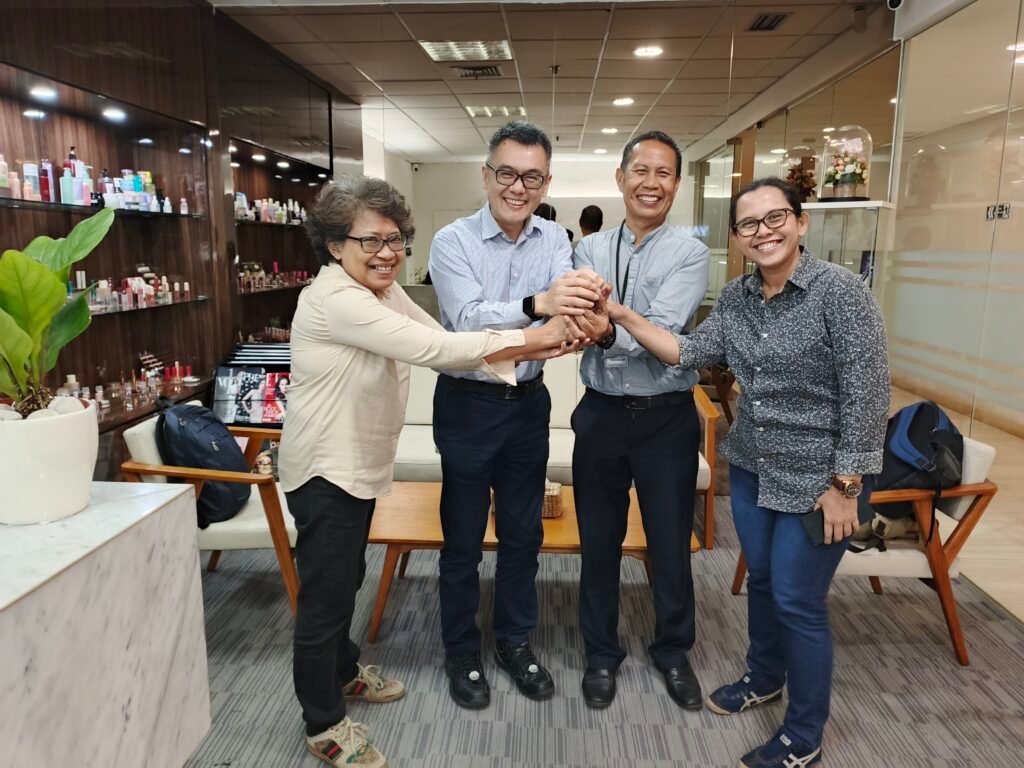
RoeKI and Sinarmas held a strategic discussion on the market demand for 2,000 tons of coconut oil per month. Beyond addressing this large-scale demand, both parties also explored the potential of utilizing coconut by-products, particularly coir, to develop composites and other innovative materials with high added value.
This collaboration reflects a shared commitment to strengthening Indonesia’s position in the global coconut industry by promoting full utilization of the crop—from oil to by-products—under a sustainable and integrated approach. By creating downstream innovations, the partnership aims to open new market opportunities, enhance competitiveness, and generate greater economic impact for coconut farmers across the country.
Through synergy between industry and farmer-based supply chains, this initiative is expected to accelerate innovation, attract investment, and contribute to a more sustainable future for Indonesia’s coconut secto


Building International Bridges for Innovation in Indonesia’s Coconut Sector
Building International Bridges for Innovation in Indonesia’s Coconut Sector
RoeKI welcomed guests from the Netherlands—two inspiring young entrepreneurs who are highly passionate about building and expanding their businesses. The discussion focused not only on sharing entrepreneurial experiences, but also on exploring opportunities for collaboration in the coconut sector, particularly in developing innovative products and strengthening access to international markets.
This dialogue reflects RoeKI’s commitment to connecting Indonesia’s coconut industry with global partners, fostering cross-border knowledge exchange, and creating sustainable business opportunities. By engaging with international entrepreneurs, RoeKI aims to encourage innovation, attract investment, and support the long-term growth of coconut-based enterprises that benefit farmers and communities across Indonesia.
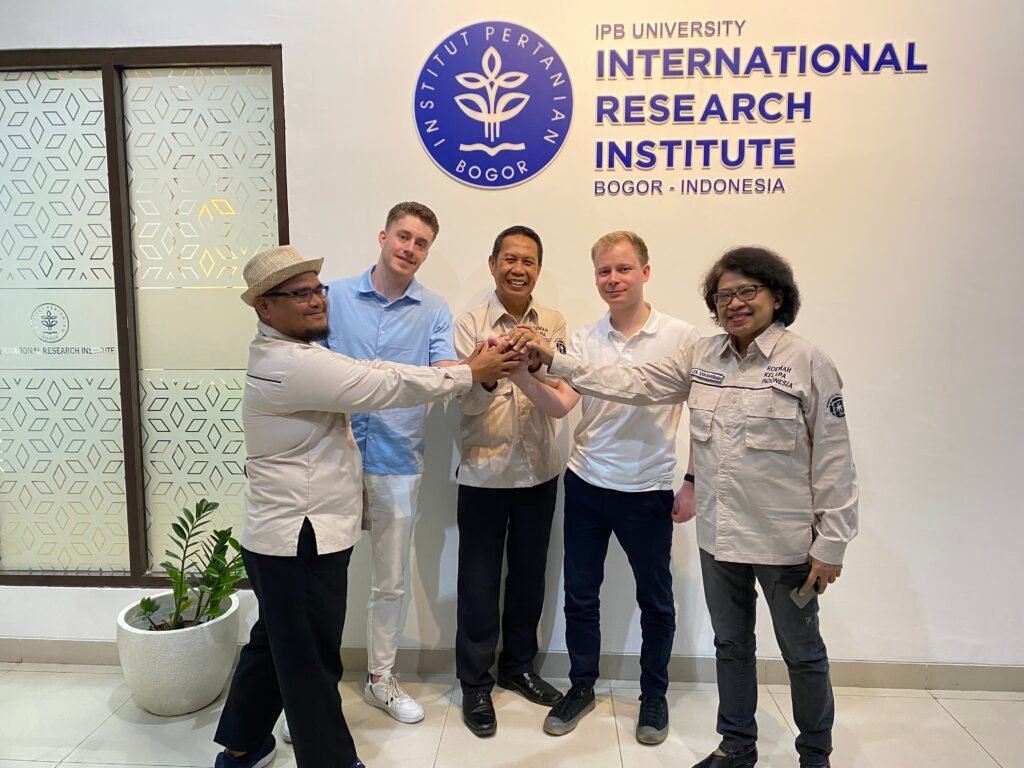
RoeKI welcomed guests from the Netherlands—two inspiring young entrepreneurs who are highly passionate about building and expanding their businesses. The discussion focused not only on sharing entrepreneurial experiences, but also on exploring opportunities for collaboration in the coconut sector, particularly in developing innovative products and strengthening access to international markets.
This dialogue reflects RoeKI’s commitment to connecting Indonesia’s coconut industry with global partners, fostering cross-border knowledge exchange, and creating sustainable business opportunities. By engaging with international entrepreneurs, RoeKI aims to encourage innovation, attract investment, and support the long-term growth of coconut-based enterprises that benefit farmers and communities across Indonesia.

Empowering Coconut Farmers and SMEs through Charcoal Briquette Production Training in Tanjung Lesung
Empowering Coconut Farmers and SMEs through Charcoal Briquette Production Training in Tanjung Lesung
Roemah Kelapa Indonesia (RoeKI) organized an intensive two-day training program in Tanjung Lesung, Pandeglang – Banten, focusing on the sustainable production of coconut shell charcoal briquettes.
The training brought together coconut farmers, local entrepreneurs, and SMEs, providing them with both technical knowledge and hands-on experience in transforming coconut shell waste into export-quality briquettes. Beyond technical training, participants also learned about quality control, packaging standards, and international market requirements to ensure competitiveness in the global arena.
The program aimed to achieve three strategic objectives:
Capacity Building: Equip coconut farmers and SMEs with advanced skills to scale up their production capacity and improve business performance.
Value Creation from Waste: Maximize the utilization of coconut shells, a by-product often underused, by converting them into high-demand, high-value briquette products for export.
Sustainable Energy Transition: Promote renewable energy adoption starting from rural areas, reducing dependency on fossil fuels while creating new sources of income for local communities.
Through this initiative, RoeKI reinforces its commitment to building a sustainable and inclusive coconut industry ecosystem, where farmers and small businesses play a central role in driving innovation, protecting the environment, and positioning Indonesia as a global leader in renewable energy solutions.

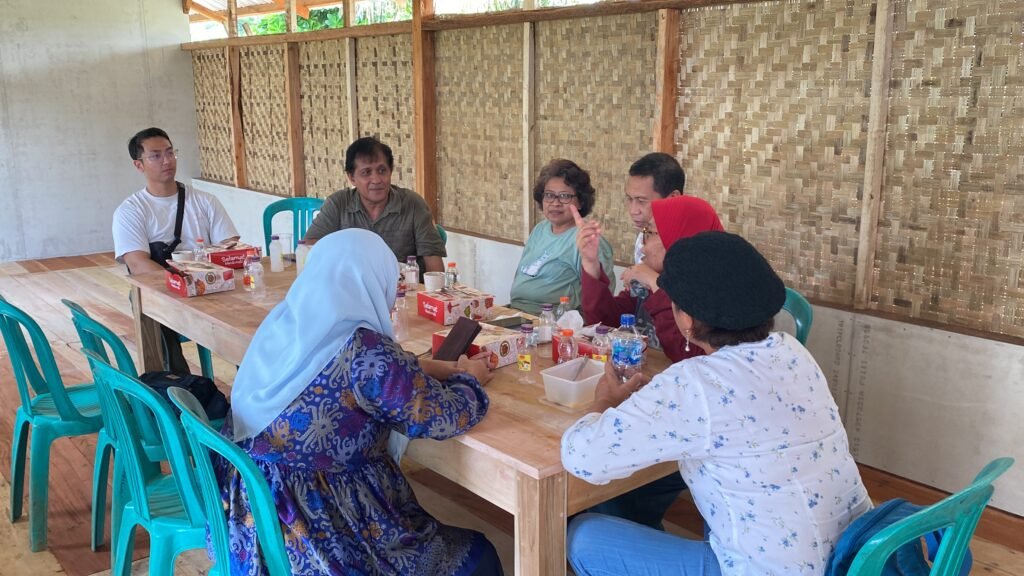
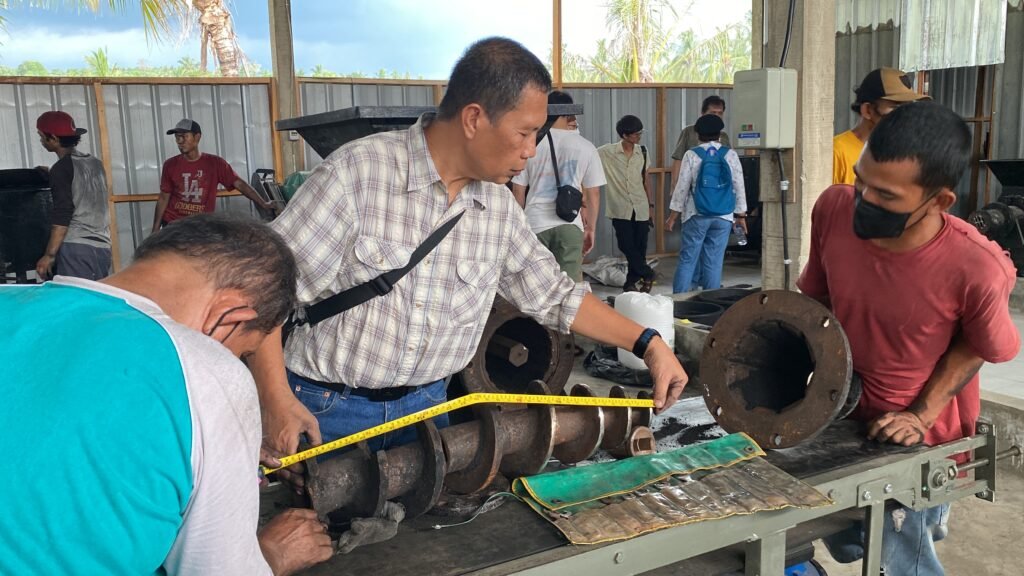
Roemah Kelapa Indonesia (RoeKI) organized an intensive two-day training program in Tanjung Lesung, Pandeglang – Banten, focusing on the sustainable production of coconut shell charcoal briquettes.
The training brought together coconut farmers, local entrepreneurs, and SMEs, providing them with both technical knowledge and hands-on experience in transforming coconut shell waste into export-quality briquettes. Beyond technical training, participants also learned about quality control, packaging standards, and international market requirements to ensure competitiveness in the global arena.
The program aimed to achieve three strategic objectives:
Capacity Building: Equip coconut farmers and SMEs with advanced skills to scale up their production capacity and improve business performance.
Value Creation from Waste: Maximize the utilization of coconut shells, a by-product often underused, by converting them into high-demand, high-value briquette products for export.
Sustainable Energy Transition: Promote renewable energy adoption starting from rural areas, reducing dependency on fossil fuels while creating new sources of income for local communities.
Through this initiative, RoeKI reinforces its commitment to building a sustainable and inclusive coconut industry ecosystem, where farmers and small businesses play a central role in driving innovation, protecting the environment, and positioning Indonesia as a global leader in renewable energy solutions.



Unlocking the Potential of Coconut Shells for Sustainable Aviation Fuel
Unlocking the Potential of Coconut Shells for Sustainable Aviation Fuel
Roemah Kelapa Indonesia (RoeKI) accompanied the research team from the Surfactant and Bioenergy Research Center (SBRC) – IPB University, in collaboration with PT Pertamina, to explore the potential of coconut shells as a feedstock for Sustainable Aviation Fuel (SAF).
This initiative highlights how coconut shells, often regarded as agricultural waste, can become a strategic resource in Indonesia’s pursuit of a green energy transition. By leveraging local wisdom and the country’s abundant coconut resources, coconut shells could play a vital role in advancing renewable energy solutions, reducing carbon emissions, and supporting the global shift toward cleaner aviation fuel.
Through this collaboration, RoeKI reinforces its mission to connect the coconut industry with broader sustainability agendas, ensuring that Indonesia’s coconut by-products are not only environmentally responsible but also economically valuable in contributing to the nation’s energy resilience and global climate goals.

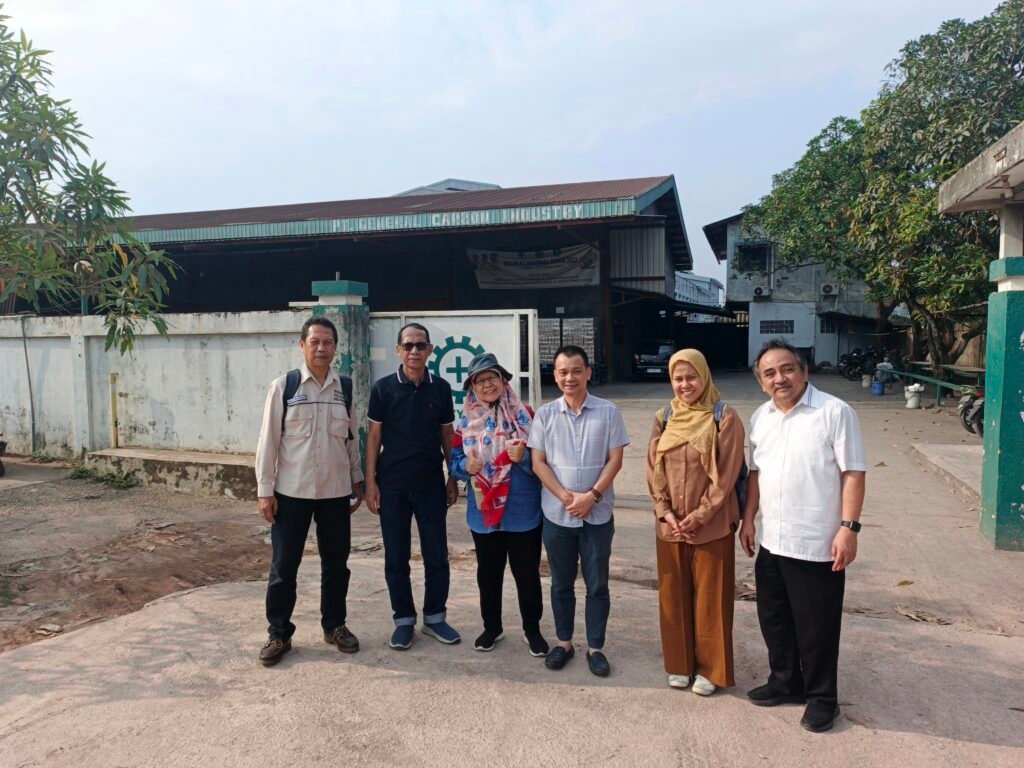
Roemah Kelapa Indonesia (RoeKI) accompanied the research team from the Surfactant and Bioenergy Research Center (SBRC) – IPB University, in collaboration with PT Pertamina, to explore the potential of coconut shells as a feedstock for Sustainable Aviation Fuel (SAF).
This initiative highlights how coconut shells, often regarded as agricultural waste, can become a strategic resource in Indonesia’s pursuit of a green energy transition. By leveraging local wisdom and the country’s abundant coconut resources, coconut shells could play a vital role in advancing renewable energy solutions, reducing carbon emissions, and supporting the global shift toward cleaner aviation fuel.
Through this collaboration, RoeKI reinforces its mission to connect the coconut industry with broader sustainability agendas, ensuring that Indonesia’s coconut by-products are not only environmentally responsible but also economically valuable in contributing to the nation’s energy resilience and global climate goals.

